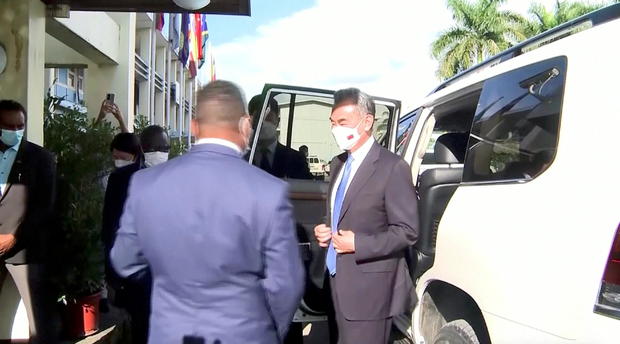China's Pacific Islands investment ambitions put on hold for now, but if U.S. doesn't make a move, Beijing will be back
Tokyo — China's top diplomat, Foreign Minister Wang Yi, was in the tiny Pacific island nation of Tonga on Tuesday, signing bilateral economic deals in a region where Beijing has sought for years to increase its influence and leverage. But the deals he signed in Tonga were not the high note on which Wang had hoped to end his tour of the Pacific Islands.
He arrived from Beijing aiming to ink a much larger omnibus deal with 10 island nations that would have formalized cooperation in areas as diverse as fisheries, communications and security. But the great unveiling never happened.
Instead, at a news conference, it was clear that disquiet among Pacific Island leaders had punted the agreement into the weeds. They asked for more time to consider China's proposal, amid worries that closer cooperation with Beijing could be a mixed blessing, with an uncertain end point.
David Panuelo, President of the Federated States of Micronesia, (who incidentally studied at the University of Eastern Oregon before returning to political life in the Pacific) called the deal, "the single most game-changing proposed agreement in the Pacific in any of our lifetimes."
It "threatens to bring a new Cold War era at best, and a world war at worst," he said.
President Panuelo was talking about the battle for influence in the Pacific between the U.S. and China.
The White House's official U.S. Indo-Pacific Strategy, published in February, says: "We will seek to be an indispensable partner to Pacific Island nations, in ever-closer coordination with other partners who share that commitment."
The Pacific Island nations, which include relative heavyweights like Fiji, and tiny rock outcrops like Nauru, are underdeveloped and threatened by climate change and rising seas.
Leaders in the region worry that they have neither the money nor the muscle to prevent what may at first look like a gift from China, of infrastructure investment in say, a port or a new airport, from morphing into a Chinese strategic foothold — think military dockyards, or airbases.
But in spite of those misgivings by regional leaders, which are shared by leaders in Washington and Europe, China has been spending lavishly across the Pacific on big construction projects, soft loans and scholarships.
In contrast, the U.S. is a long way behind on delivering concrete support, or even diplomatic presence.
In February, Antony Blinken became the first U.S. Secretary of State to visit Fiji in 36 years. President Joe Biden spent four days in Asia in May, but he paid scant attention to the Pacific Islands as he met with leaders of major regional powers including Japan, South Korea, Australia and India.
The comprehensive deal that Foreign Minister Wang had hoped to sign with the South Pacific island nations may be on hold, but it will certainly rematerialize unless America can offer terms that are just as good, or better.
for more features.

